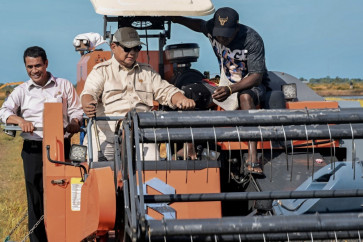Popular Reads
Top Results
Can't find what you're looking for?
View all search resultsPopular Reads
Top Results
Can't find what you're looking for?
View all search resultsBook worm: Agustinus Wibowo Exploring Creative Non-Fiction
Courtesy of Agustinus WibowoTravel writer and photographer Agustinus Wibowo covers a lot of ground in his work, from Afghanistan to Central Asia and China
Change text size
Gift Premium Articles
to Anyone
Courtesy of Agustinus Wibowo
Travel writer and photographer Agustinus Wibowo covers a lot of ground in his work, from Afghanistan to Central Asia and China.
The author, known for Selimut Debu (A Blanket of Dust), Garis Batas (Borderlines) and Titik Nol: Makna Sebuah Perjalanan (Zero), currently works on travelogues exploring ideas of nationalism and identity.
Agustinus said he taught himself to write by reading books by VS Naipaul and Paul Theroux, to name a few, as well as by reading the long-form writing of Indonesian journalist Andreas Harsono, known for his “literary journalism” style.
“I don’t read a lot of fiction. I read more non-fiction books. I refer to these books as ‘creative non-fiction’,” he said.
He believes that in order to grow as a writer, it is not enough to just take information from these books — one also needs to closely study and analyze the way the writers structure their narration.

SAPIENS
by Yuval Noah Harari
This is the story of human beings from the time we were still an insignificant animal to the contemporary era, when we seem to have become the Earth’s absolute ruler. What fascinates me is the fact that human beings are actually physically very weak compared to other animals.
Our strength lies in our ability to invent language and myths to cooperate with one another. These myths come in various shapes and forms: nationalism, religious traditions, etc. The myths affect our lives powerfully and help us make us-against-them and friend-versus-foe distinctions to maintain our survival. The writer is able to be detached from his identity as a human being and write this book from a detached, elevated point of view, to chronicle human lives in an objective manner, while criticizing claims that human beings are a superior animal.
IMPERIUM
by Ryszard Kapuściński
The late Kapuściński was a polish journalist who travelled around the world, visiting India, Africa, Latin America and many other countries. This book is about the Soviet Union, part of the Russian imperium. In the imperium, national boundaries are arbitrary and are subject to change. The book is partly memoir, because he also lived through the annexation of Poland by the Soviet Union. He explores the emotions of the people involved in a very detailed manner without drowning in them. I’ve never read a non-fiction book that caused me to shiver like this one. This book is the polar opposite of Sapiens because it is very personal.
AMONG THE BELIEVERS
by VS Naipaul
This is the first travel writing book that I read that percolated in my brain. I learned from the author’s critical viewpoint, which looks at
religion not just through its human-God dimension, but also its political aspects. This book details Naipaul’s travels to countries with big Muslim populations such as Indonesia, Malaysia, Iran and Pakistan, among others, because the Islamic Revolution in Iran had sparked his interest to learn more about Islam as well as political Islam. To write this book, he also paid a visit to Yogyakarta in the 1970s, from which we can learn little-known aspects of Indonesia’s history with Islam and religion in general.










